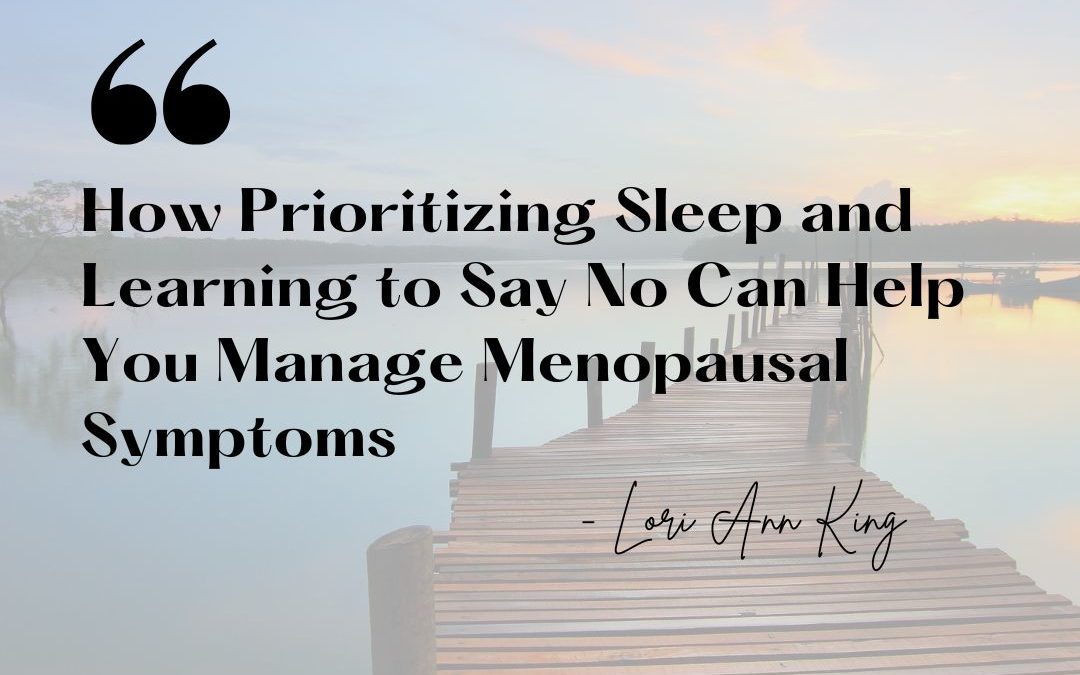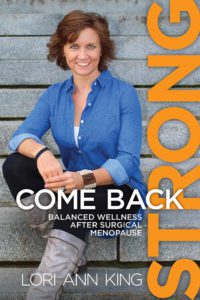When I was thrust into surgical menopause in 2015, I had no idea what to expect. At that time, I thought menopause symptoms only consisted of hot flashes and night sweats. But when chronic insomnia hit, I couldn’t fall asleep or stay asleep. I had no idea poor sleep was a menopausal symptom.
Lack of sleep can leave the most pleasant person miserable, and I was no different. My poor sleep quality left me groggy, unfocused, and irritable and disrupted my life on many levels. Here are a few tips and simple lifestyle tweaks to help you improve the quality of sleep during menopause.
Premenopause, Perimenopause, Post-Menopause, Surgical Menopause: What’s the difference?
In my book Come Back Strong, I wrote about the difference between the many stages of menopause:
“Premenopause arrives first. We may not even notice any changes in our bodies, minds, or moods, but our levels of estrogen and progesterone are beginning to drop.
Perimenopause is next. Estrogen levels continue to drop and symptoms begin to arrive for the “party.” Our period becomes irregular. Night sweats and hot flashes begin.
Menopause officially arrives when the ovaries stop releasing eggs.
Medically speaking, we have reached postmenopause when we have been without a menstrual period for over a year. We remain postmenopausal until the end of life, even if symptoms continue for months or even years.
The main difference between surgical menopause and natural menopause is the timeframe and intensity of the symptoms related to the transition. During natural menopause, symptoms appear gradually and are sometimes so subtle that we barely notice the changes; and when we do, we can tackle one or two symptoms at a time as they pop up. By contrast, sudden menopause begins the moment the ovaries are surgically removed (oophorectomy) or are damaged by disease, radiation, chemotherapy, or other medications. This damage to or removal of the ovaries causes a sudden drop in estrogen and a deficit that will not be replenished due to missing ovaries and causes an immediate plunge into menopause.”
Common Symptoms of Menopause
Whether you enter menopause naturally or surgically, you may get one of these, all of these, or none of these symptoms of menopause:
- Hot Flashes/Hot Flushes
- Night Sweats
- Insomnia/Sleep Issues
- Itch Due to Dryness (skin, scalp, eyes)
- Irritable/Mood Swings
- Weight Gain
- Memory Loss
- Vaginal Dryness & Atrophy
- Irregular periods
- Hair Loss/Thinning
- Dizziness/Headaches/Migraines
- Depression
- Anxiety
Signs of Poor Sleep in Menopausal Women
The following is a list of signs that indicate sleep difficulties. Ask yourself, do you
- Have difficulty waking up in the morning?
- Require more stimulants (caffeine, sugar) to keep going?
- Utilize alcohol, sleeping pills, or other substances to wind down or fall asleep?
- Exhibit a shorter fuse than normal, especially with loved ones?
- Experience a lack of focus?
What Causes Insomnia or Sleep Disturbances in Menopause?
According to Women’s Health Concerns, it is the decline in estrogen that contributes to sleep issues.
“Melatonin, another vital hormone for sleep, decreases with age. Secretion of melatonin is partly influenced by estrogen and progesterone and levels decrease during the perimenopause, often compounding the problem.”
There is also an overlapping and compounding effect of symptoms:
- Anxiety can lead to difficulty falling asleep.
- Depression can lead to non-restorative sleep and early morning wakening.
- Hot flushes can make sleep uncomfortable.
- Joint aches and pains and bladder problems, such as passing urine at night, are also common during menopause and can contribute to disturbed sleep.
Progesterone has a sleep-inducing effect by acting on brain pathways, so declines in progesterone during menopause can be an issue.
Does Hormone Replacement Therapy (HRT) Help You Sleep During Menopause
I have been fortunate to have a great medical support team that has worked with me since my hysterectomy/oophorectomy, which sent me into surgical menopause. Hormone therapy has been a lifesaver, improving the quality of my life. While they’ve both been around for decades, there is a lot of controversy over the use of both synthetic and bioidentical hormones. Taking hormone replacements must feel right for you, your belief system, and your knowledge of health and safety.
Here is another excerpt from my book Come Back Strong, explaining the difference between synthetic and bioidentical hormone replacement therapy.
Synthetic hormones have been around for years in the form of Premarin, Provera, and even low-dose birth control pills. Synthetic means humanmade from chemical sources. The goal is to create hormones that are similar, although not necessarily identical, to what your body naturally makes to alleviate symptoms. Many doctors prescribe synthetic hormones and many insurance companies cover the cost.
Bioidentical hormones are humanmade and plant-based, however, they have the identical chemical structure as the hormones made by our ovaries. Bioidentical hormones are prescribed by a doctor and filled through a compounding pharmacy. The cost is most likely not covered by insurance.
I have bloodwork done regularly to monitor my hormone levels. My doctors also take into consideration my symptoms. Sometimes, even when my bloodwork comes back normal, I’m not feeling my best, so they tweak my dosage. For me, BHRT includes a combination of estrogen, progesterone, and testosterone.
I started out with 100 mg of progesterone taken orally at night. But when I was still struggling with insomnia, my doctor increased my dosage to 200 mg and that made all the difference.
The bottom line is, talk to your doctors. Hormone and anti-aging specialists may include gynecologists, internists, family practitioners, and endocrinologists. Explore your options and make an educated decision for this point in time. Then, go to work on lifestyle changes that help to alleviate your symptoms naturally and rebalance your health so that, under the guidance of your medical team, you eventually may not require pharmaceuticals.
Simple Lifestyle Tweaks To Improve Sleep Quality Naturally, Without Hormone Therapy
You may decide to skip hormone therapy all together, or you may need complementary medicine or lifestyle changes to help if you are a menopausal woman. Here are a few suggestions for lifestyle modification you can try:
-
Acupuncture
- Massage Therapy
- Yoga
- Meditation
- Reduce or eliminate caffeine
- Turn off all electronics, including television, computer, and phone a couple of hours before bed
- Take a bath
- Drink chamomile tea
- Melatonin
- Magnesium
- Limit Spicy Foods
- Keep a Sleep Diary to share with your doctor
Two simple lifestyle tweaks and self-care practices that help improve my insomnia include monitoring my schedule and learning to say no.
 Monitor Your Schedule
Monitor Your Schedule
Many of us fill every minute of the day, from the moment our feet hit the floor in the morning to the second our head hits the pillow. Surgery did one thing for sure: It took me down. I was forced to rest, which was a good thing. Good, but not always easy for a type A personality like me. I work hard, and I play hard. I’ve now learned to rest as well.
These days, I manage my energy more than my calendar, which helps with my sleep issues. If I have an event that goes late on a Wednesday night, I do my best to create a quieter, later Thursday morning. If I’m used to being at the gym before work five days a week, I may cut back to four or even three. And I make sure that the activities and events of my life align with my goals and priorities. I postpone and delegate where I can.
Empower Yourself By Learning to Say No
In managing your energy and your calendar, you may also need to learn to say no. If we do not intentionally guard our calendar, other people will find a way to monopolize it. It may be someone at work, a family member or a friend, or someone at your place of worship. People have good intentions but only you can set boundaries on your time, energy, and health.
Remember this: every time you say yes to something, you are making a promise and a commitment to someone else. What you have to ask yourself in the split second it takes to say yes or no is, does your yes come with a compromise to yourself, your goals, your family, or your health?
When you say yes to something you don’t even want to do, you are disappointing yourself. And when you do that, you open the door to negative feelings of guilt and shame, which contribute to increased stress and can exacerbate menopause symptoms.
Additional Resources:
From my blog:
Buy Now:
 Praise for Come Back Strong
Praise for Come Back Strong
“As a health practitioner passionate about educating women to be their own best advocates and make wise decisions about their hormonal and sexual health, I highly recommend Lori Ann King’s informative and inspirational book, Come Back Strong. It is an enormous contribution to an often-confusing area.” (Camille Lawson, RN, M.ED. Hormone, Health, and Sexuality Advisor)
“An extraordinary story by an extraordinary woman. Having had the honor of working with Lori for a year, I witnessed a spirit that elevated all around her. Lori’s book cuts through the esoteric nonsense about ‘bouncing back’ or ‘hanging in there’ and gives you a beautiful, step-by-step process not just to come back but to live a life of wonder and explode your potential. (Mark Januszewski, Best-Selling Author, Speaker, Business Trainer)
“Real, raw, informative! Lori Ann King has created a book that is such a gift for women who have gone through surgical menopause. You get a real sense of the struggle and accomplishments that can happen during this time. This short read is packed with research and information that is invaluable.” (Michelle Renar, LMT, Owner, Hudson Valley Body Works)
Prefer the video version? Check out my online course: BALANCED WELLNESS DURING MENOPAUSE
 Renewal Sleep Support™
Renewal Sleep Support™
Sometimes the only difference between being stressed and being your best is a good night’s sleep. This fast-acting oral melatonin sleep spray is infused with scientifically proven botanicals to help realign the body’s natural sleep cycle.
- Supports improved sleep quality for a more restful night*
- Enriched with melatonin, tart cherry, valerian root, chamomile, and L-theanine.†
- Can help relieve the effects of jet lag*
- Refreshing cool spearmint flavor
- No artificial flavors, sweeteners, or preservatives
 Sleep Better Bundle
Sleep Better Bundle
Stress less, sleep better, and wake refreshed. This bundle provides you with a 30-day supply of both Adaptogen Elixir and Renewal Sleep Support™. The unique blend of healing herbs, botanicals, and adaptogens found in Adaptogen Elixir creates a time-tested yet modern way of managing daily stress. Renewal Sleep Support’s melatonin and restful botanicals including chamomile, tart cherry, and valerian root help support a good night’s sleep.†
Contents
- 3 Adaptogen Elixir 10ct
- 1 Renewal Sleep Support
Other Books:
I have been blessed and humbled to partner with the following authors on my own journey through menopause. Together, we all hope to empower YOU to live a life of true health, love, laughter, and freedom, especially during your menopause transition.
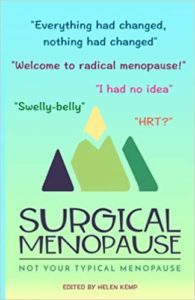
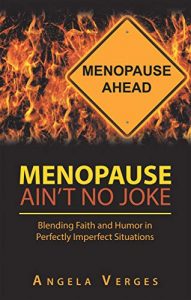
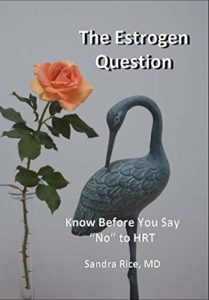
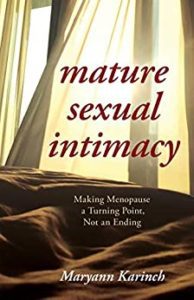 Buy Now: Surgical Menopause ~ Not Your Typical Menopause [ Paperback ] [ Kindle ]
Buy Now: Surgical Menopause ~ Not Your Typical Menopause [ Paperback ] [ Kindle ]
By Helen Kemp
Buy Now: Menopause Ain’t No Joke [ Paperback ] [ Kindle ]
By Angela Verges
Buy Now: The Estrogen Question: Know Before You Say “No” to HRT [ Paperback ] [ Kindle ] Currently $0.00 w/ Kindle Unlimited
By Sandra Rice, MD
Buy Now: Mature Sexual Intimacy: Making Menopause a Turning Point not an Ending [ Hardcover ] [ Kindle ]
By Maryann Karinch
With love, gratitude, and kindness,
Lori

